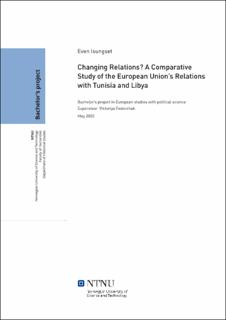Changing Relations? A Comparative Study of the European Union’s Relations with Tunisia and Libya
| dc.contributor.advisor | Fedorchak, Viktoriya | |
| dc.contributor.author | Isungset, Even | |
| dc.date.accessioned | 2021-09-13T16:01:51Z | |
| dc.date.available | 2021-09-13T16:01:51Z | |
| dc.date.issued | 2020 | |
| dc.identifier | no.ntnu:inspera:57494640:26501892 | |
| dc.identifier.uri | https://hdl.handle.net/11250/2775502 | |
| dc.description.abstract | Oppgaven undersøker EU sine relasjoner til Tunisia og Libya i perioden 2014 til 2020. Det for å se om det har vært endringer i forholdet og hvordan EU sine relasjoner er forskjellige til de to landene. Oppgaven undersøker også om Ursula von der Leyen sin nye kommisjon har ført til endringer i EU sitt forhold til Libya og Tunisia. Forskningsmetodene som blir bruk for å analysere dette er komparative dokumentcasestudier. Metoden er blitt valgt for å få dyptgående kunnskap om enkelte saker, samtidig som metodene ikke krever altfor mye ressurser. Oppgaven kommer til tre hovedkonklusjoner. For det første at EU sitt forhold til Libya er basert på å skape sikkerhet, for eksempel grensekontroll og våpenembargo. Forholdet til Tunisia derimot er i større grad basert på normative områder. For det andre har den nye kommisjonen ikke enda skapt store endringer i forholdene til de to nabolandene. Det kan allikevel tenkes at det er mer sannsynlig at den nye kommisjonen får gjennomslag på sine ambisjoner om en grønn transformering og digitalisering i Tunisia, basert på det konstruktivistiske «modell student» konseptet. I Libya strever den nye kommisjonen allerede med sine geopolitiske ambisjoner ettersom andre land inkludert Russland og Tyrkia har begynt å ta ledelsen på bakken. EU sin nye Operasjon IRINI har også møtt på problemer. Til slutt finner oppgaven at å konseptualisere EU som et normativt imperium er nyttig for å forstå de forskjellige relasjonene EU har til Tunisia og Libya. Dette basert på en kombinasjon av realist og konstruktivistiske antagelser. | |
| dc.description.abstract | The thesis explores the EU’s relations with Tunisia and Libya in the period of 2014 to 2020, to investigate if there has been a change in relations and how this relationship differs with the two countries. The thesis also investigates if Ursula von der Leyen’s new commission signals a change in these relations. The methods the thesis employs are comparative document case studies, which is chosen because these methods help produce deep knowledge of specific cases, while requiring less resources than other methods. The thesis has three main findings. Firstly, that the EU’s relations with Libya is mostly focused on security aspects, like border control and upholding arms embargoes. The EU’s relations with Tunisia, however, focuses more on normative issues. Secondly, that the new Commission has not yet changed much in the relations with the two neighbor countries. Nevertheless, the commissions new ambitions on green transitions and digital transformation might be more likely to succeed in Tunisia based on the constructivist “model student” concept. Further, in Libya the new Commission is already struggling with its geopolitical ambitions as other actors including Russia and Turkey has taken the lead on the ground in Libya, and the EU’s new Operation IRINI is already encountering difficulties. Lastly the thesis finds that the concept of the EU as a normative empire, can explain the EU’s relations with the two countries by combining realist and constructivist assumption and therefore explaining the differences in relations the EU has with Tunisia and Libya. | |
| dc.language | ||
| dc.publisher | NTNU | |
| dc.title | Changing Relations? A Comparative Study of the European Union’s Relations with Tunisia and Libya | |
| dc.type | Bachelor thesis |
